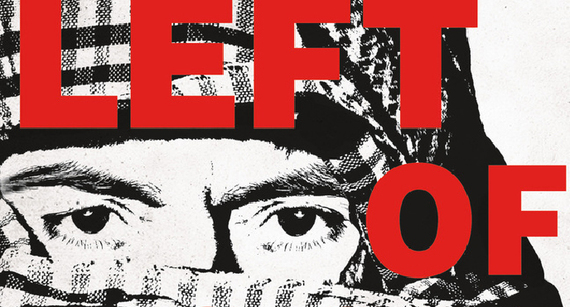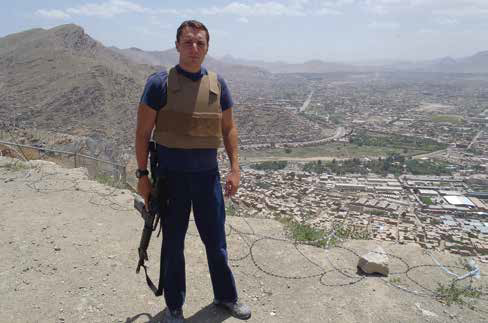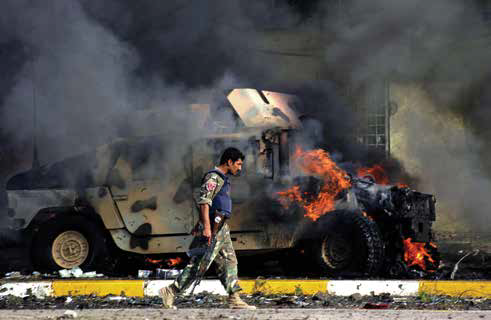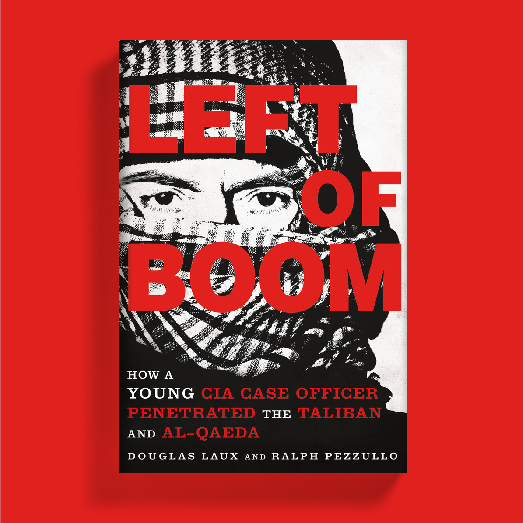It's not every day I meet a covert operative.
I sit across the table from Douglas Laux, a young ex-CIA agent, wondering just what his abilities are. Has he identified every threat in the bar? Has he mapped his emergency egress? Can he intuit my emotional state? Can he terminate me? Play it cool, I think. I don't want to out myself as a noob.
As Doug flags down a waiter, my eyes drift over him. What I see surprises me. I suppose it should; he is, after all, a spy. He specializes in trapping targets unawares. But it's his ordinariness that catches me off guard.
Take, for instance, his appearance. I expected an intelligence officer to put on airs of, well, intelligence. Power blazer, French cuffs, penny loafers—that sort of thing. But Doug lounges in faded dungarees and a Guns n' Roses tee. With dusty-blond tufts curling behind the ears, a hooked schnozz, and a long-haul trucker's beard, he reads closer to Danny McBride than Daniel Craig.
And then there's the venue selection. Doug could have bilked me for a night at any one of New York City's glitzy clubs or secret speakeasies. Instead, he brought me to McSorley's, the oldest pub in town, where sepia photographs crowd the wall behind a bare-bones bar and sawdust soaks up beer on the floor. Here among the Tuesday-night patrons in all their working-class glory, I see Doug exactly for who he is: a regular guy.
This fact makes him all the more extraordinary to me. From his exploits, detailed in his debut memoir from St. Martin's Press, Doug is a veritable badass. He's fought the war on al-Qaeda in the trenches and lived to tell it. But if he feels he's too cool for a press interview with a joker like me, he doesn't let on. In fact he almost seems nervous. Mouse quiet, he stares up awkwardly at a newspaper clipping from the mid-19th century.
When the waiter arrives, Doug orders a "light" beer (the only other choice is "dark") and a rare burger; he asks for it nice and pink. I order the same. While we wait in silence, we soak up the heat from the copper coal-burning stove nearby. In moments four half-pints hit the table.
We chink cheap glass steins and begin.
I understand you're an expert on Afghanistan. Has Lonely Planet tapped you to write their guidebook yet?
D: They have not, which would be weird if they did since I just recently revealed my true name. But wouldn't that be something? My guidebook would be one page with one word. "Don't."
So which is a more accurate depiction of your job, Archer or Homeland?
D: Archer.
What's it like to sit across the table from a no-shit al-Qaeda operative or Taliban fighter?
D: The first time I kept thinking, "This is it? This dude?" But then, as it became more habitual and meetings became more regular, I didn't even think of them as AQ or Taliban any longer, but just as "my sources." In fact, I mention in my book that one of the guys I worked had pretty striking features and was really intelligent, and I thought there was no reason he couldn't be cleaning up at DC clubs...or at the very least Tuesday's in Clarendon.
A Taliban "Night at the Roxbury?"
D: [Laughs.] Something like that. Seriously, he would have made a great wingman—well, if I didn't think he was going to kill me.
Sign up for more essays, interviews and excerpts from Thought Matters.
ThoughtMatters is a partnership between Macmillan Publishers and Huffington Post
In a fair fight, who wins, ISIS or Taliban?
D: Well, neither side ever fights by our terms of 'fair' so that is kind of an oxymoron. But if it were a fist fight, the Taliban guy wins that 10/10 times no questions asked. Most of the ISIS fighters, from what I can tell, are Internet-savvy guys with a shitload of GoPros. They can cut off the head of a zip-tied captive, but they're shit in a brawl. Taliban bubbas don't have electricity and consider running water a luxury. They know how to use their knuckles.
After reading the New York Times series on the ISIS rape war machine, I considered joining the Peshmerga on the front lines myself. Any advice?
D: Yes, read page one of my Lonely Planet Guide to Afghanistan.
Our burgers arrive on a thin paper plate, and we dig in. Doug orders another round of beers to wash down the grub. For a second, it feels like we're two old frat buddies catching up after a run-in on the street.
Let's talk about your recent publication. What prompted you to write a book about your time at CIA?
D: Well, I read quite a few books written by former officers when I was joining the CIA. For example, I read Lindsey Moran's "Blowing My Cover" despite my recruiters' warnings not to because she skipped the Agency's obligatory Publication Review Board process. In spite of all the ax-grinding and whining, I still found the career compelling enough to sign up. In that vein, I figured my voice and experiences might lend another perspective to others out there who may find themselves in that position.
So why do the folks at the Agency find beef with it?
D: Sometimes it becomes an issue of authenticity and credibility. Agency officers work really hard. They make a lot of sacrifices without any recognition. As a result, they take pride in their exclusive access to intel and experience.
About the job, you mean.
D: Right, about the job. I remember a retired senior case officer wrote a scathing review of it for some newspaper completely trashing Lindsey [Moran] for not having served long enough to have any perspective. The senior officer said something like "It's like a 1st year med student writing about brain surgery," and I thought, "No, it's not. It's like a 1st year med student writing about her first year in med school." But again, it didn't really matter how long she had been in, it was more that she had simply written a book in the first place.
How do you expect your former colleagues to react to your book?
D: Oh, well, they have already reacted, and it's pretty much exactly how I expected them to act—which is how everyone in the Agency acts when someone writes a book.
And how's that?
D: They hate it.
But have they even read it?
D: Doesn't matter. They are livid. To be completely honest, I don't blame them. I was the same way. And that's because the Agency gets shit on so goddamn much in the media that everything and anything that comes out is always negative. You never hear a glowing story about the Agency and how terrific they are. It's always bad. So when that becomes the norm, you start to develop a real aversion for all the haters out there and turn inward to the only people who understand your line of work—your colleagues. Then, when one of them writes a book like Bob Baer or a TV show like the Americans, suddenly that writer becomes one of "them," an outsider, an attention-whore, and they can't be trusted. It's really quite sad. I've been told that many former colleagues hate my guts right now, which is unfortunate. I didn't want to lose the respect of the people I admire. But I accept it. I don't blame them.
Doug takes a long drink from his glass, and I decide to move on.
You seem like a regular Joe. What surprised you most about the life and work of a spy?
D: That's an easy one, and it's something I noticed on the first day and every day thereafter. And that was how the place operated and how it all felt really normal. Let me explain. What I mean by that is regardless of all the perceptions and expectations of what the CIA is or isn't, it's still staffed by humans going about their daily lives. They aren't robots. They still have to eat breakfast, lunch, and dinner. They still have birthdays and weddings and funerals. They still have spouses and children who go to school with non-Agency children. And sometimes they get sick and have a cold or a sore throat or the flu. Life still goes on around them, and as a result, no matter how bizarre the actual occupation might be, it quickly becomes just your job, just like anyone else's. You have your professional career and your personal life like everyone else. While this profession probably leans harder into your personal life than any other job I can think of, you still wake up on Monday mornings like, "Fuck, I have to go into work."
Really? You never think, "Man, I can't believe I get paid for this?"
D: Sometimes, sure. But then reality slaps you in the face. You've got another goddamned cable to write or another stupid approval to request, and all the sudden the grindstone is sanding off the tip of your nose.
From what I've read of your book, it sounds like you butted heads with your managers quite a bit. What was it that caused the most trouble for you?
D: Actually, I was pretty good at taking orders. I had a reputation for being "squared away" and could be relied upon not to fuck up a complex assignment. Concurrent to that, it became evident early on to management that I never intended to make a career out of my time at the Agency, which made managing me difficult. Essentially, it took away both the carrot and the stick from them, as there was no way to award me through promotion or discipline me with something punitive because I didn't care either way. So I wouldn't say that I butted heads with management inasmuch that I gave them a lot of heartburn. They knew if they told me no, I would respect their command, but I would always ask them to explain their reasoning. "Because I said so" didn't work on me. We often could come to an agreement through long and sometimes heated dialogue that ensued. So again, I wasn't a problematic or difficult officer to manage, I just wasn't easy either.
Do you think you were well suited for Agency culture?
D: I'm still certain that I'm not sure.
There's a stereotype that Case Officers run operations like cowboys, with little oversight or accountability. In your experience, did that bear out?
D: It is precisely the opposite. There is a tremendous amount of oversight and a shit-ton of red tape everywhere you turn. The concept of a cowboy case officer is laughable. You would be squashed like a bug the second someone even thought you might be hinging on pulling some Bond-type shit.
Your book discusses in surprising depth about the personal costs of the job, in terms of PTSD, relationships, substance abuse, etc. Would you say it was a net positive in your life?
D: Yeah, it made me a man. Looking back it is very clear to me I was still a boy when I started. I look at how I handled my relationships with both friends and girlfriends and how I performed my duties at work and ultimately, all of it was very, very selfish. I see that now, was blind to it back then. Honestly, writing the book helped me to take a step back and look at everything that happened and analyze what it all meant. I could have easily edited it all to make me sound more clairvoyant or less of an asshole after the fact, but it would have been a much different story were that the case. I tried to relate exactly how I felt at the specific time of the story and often would think, "Jesus, I was such a fucking whiny brat back then." But I was. And I recognize that and I am sure the reader will see it as well. But hopefully, they also see me mature throughout the chapters in sort of a coming of age story.
Can you name a good trait or experience you developed because of your work?
D: Time management. You said good trait, right? Then yes, time management.
Would you recommend today's young professionals look to the CIA for career opportunities?
D: "It depends." That is the phrase you will hear more than any other at the Agency. If that doesn't deter you, then yes, you should join. If you don't do well with ambiguity, then no, you should not.
Some people envision a certain type of person when they hear CIA operative. Tell us about why you applied to the Agency.
D: Great question, and the most honest answer is that I applied because I never in a million years thought I would get in! If your senior year in college was anything like mine, you come to a pretty stark realization that you are not going to land as the wolf of Wall Street for your first job. You learn pretty quick that everything that is being offered you is entry level or unpaid, which really sucks. So for me, I was just blanketing every site on the internet with my resume and taking every interview I could that didn't require me to travel to their home office for the initial meeting. One of my degrees was also in the Japanese language so I thought I might be able to parlay that into a governmental job of some sort but never expected it to be with the Agency. But lo and behold they called me up one morning completely out of the blue, and that was my initial interview. I did horribly and thought that would be the end of it, but I guess I was either too hard on myself or the Agency was desperate enough to take any geek off the street at that point. Probably the latter.
At this point, I'm feeling a little tipsy. It's not the strongest beer, but I'm a lightweight. Doug doesn't seem to mind—he's got nothing to prove.
Was dropping your cover part of telling this story?
D: Making my true identity known had to happen in terms of credibility and perhaps most importantly, acceptance by the public. Were I to do this anonymously then it would be far too easy for the general public to write my book off as a gimmick of the Agency and suggest that I didn't actually exist or that I was coopted to write the book on their behalf. If you read it, it becomes immediately clear that could not be the case given how critical I can be at times of some of the more ridiculous situations that continue in the Agency to this day.
How many throats would you say you ripped from people's necks?
D: I prefer the Steven Segal neck-snap. I am usually happy with a Turkey a day but I have been known in my prime to bowl a perfect game if you catch my drift.
I should clarify that was a joke. I wouldn't want readers to assume this was a Robert Durst moment.
D: Good call.
Do you have any regrets about your time at CIA?
D: [Snorts.] Yeah, you could say that. For sure. But that's being out of the game for three years talking. If you had asked me on the day I quit I would have told you, "Zero." And by and large, I don't really regret my activities with the Agency per se. There were certainly a lot of things I would have liked to have done differently, but that would have required a lot more than just my making a change. Often times it would have taken an entire change in policy, which wasn't going to happen over night. My role in the Syrian affair was a perfect example. I would have loved for it to have gone my way, and I regret that it didn't, but there wasn't much I could do to effect the change that I wanted, so I suppose those regrets will always have to be viewed as inevitable.
Any in your personal life?
D: I could have done a lot differently. I especially regret how I treated my family and friends, and I guess most specifically, the women who put up with me over the past decade. I regret just about every second of my behavior with them because looking back, three years removed, I realize that it actually wouldn't have been that big of a deal if I would have just told them who I really was after I trusted them. They weren't stupid, and you see in the book that they regularly accused me of working for the Agency. They were 99.9% sure I worked there and 100% sure I was lying to them about what I really did for a living and where I was in the world. I don't think anyone at all ever truly believed I was in Hawaii, but they just accepted it to avoid confrontation or having to deal with reality. Like that steak scene in the movie the Matrix, "Ignorance is bliss. I choose the Matrix."
Dude, that's really sad.
D: Is that a question?
No, just an observation, if I may.
D: [Laughs.] Yeah, I think I could have and should have told those closest to me—my girlfriends—what I was doing to alleviate the pressure from all the lies I was telling them. From their perspective, if I was willing to lie about my job, what wouldn't I lie about? Not a good feeling to know that the person you love knows that you know that they know you are a liar.
So why did they stay with you then?
D: I honestly can't say. I guess because deep down they knew it wasn't out of malice, and they could tell that it hurt me to lie to them. They could sense it, each and every time I got caught in a lie, that I didn't particularly feel good about it. Anyhow, looking back now, I really put all of them through hell.
Jesus, how many were there?
D: It's embarrassing that I have to pluralize the word 'girlfriend.' I would have been comfortable remaining in a relationship with each of them, but I pushed them all away on account of my 'dedication to the mission.'
Shifting gears, any traumatic childhood experiences that might shed light on your hidden psychology?
D: You're really trying to get me to dig deep.
Of course. I'm a professional.
D: [Laughs.] I can see that.
So?
D: To be honest, I don't talk about my family or my childhood much in my book because there's really not that much to it. Small town USA without much to do or anywhere to go. Pretty stereotypical story where all of the standard platitudes fit. Strangely, that seems to be the way a lot of the books I read about the military tend to go. I just skip over those sections—which inevitably is always Chapter 2. It's also Chapter 2 in my book, so feel free to skip it!
What's next for you?
D: I would be lying to you if I told you I had a Plan B. Right now the only thing on my horizon is to let the book drop, give it some room, fan it some oxygen, and see what happens.
I can understand that.
D: See, we're not so different, you and me.
Indeed. Well, Doug, it has been a pleasure to chat with you. Best of luck in your next career, whatever that turns out to be.
D: It was my pleasure.
One last question.
D: Shoot.
Where are the bathrooms?
D: In the back. Careful not to fall into the urinals. They're huge.
Doug Laux is a former CIA Case Officer. His debut memoir, Left of Boom: How a Young CIA Case Officer Penetrated the Taliban and Al-Qaeda, was released by St. Martin's Press 05 April 2016.
Tom O'Brier is a writer living in New York City.
Read more at Thought Matters. Sign up for originals essays, interviews, and excerpts from some of the most influential minds of our age.




